As Israel bombards Gaza, fears of humanitarian disaster mount
More than a quarter-million Gazans flee their homes and some try to escape the strip for Egypt.
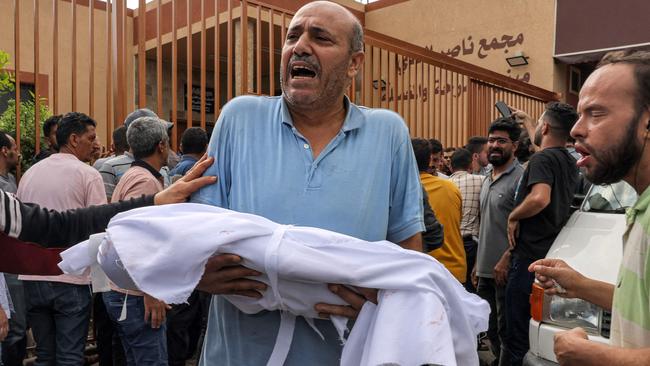
More than a quarter-million Gazans fled their homes and some tried to escape the strip for Egypt as Israeli forces launched new rounds of airstrikes in the enclave and exchanged fire with militants in Lebanon.
The bombardments following Saturday’s devastating attack by Hamas -- which killed more than 1,200 Israelis, mostly civilians -- raised concerns about an escalating humanitarian crisis in Gaza, while skirmishes along Israel’s northern border threaten a regional expansion of the conflict.
At an event with Jewish community leaders Wednesday, President Biden called the Hamas attacks on Israel the “deadliest day for Jews since the Holocaust” and a “campaign of pure cruelty.” He added, “It matters that Americans see what is happening. I have been doing this a long time -- I never really thought that I would see and have confirmed pictures of terrorists beheading children.”
Israeli strikes have killed at least 1,100 Palestinians in Gaza since Saturday, according to the enclave’s Health Ministry. Most of the strip’s more than two million residents have no way of fleeing the enclave, which is about twice the size of Washington, D.C., and has been all but sealed off from the world by Israel and Egypt for years.
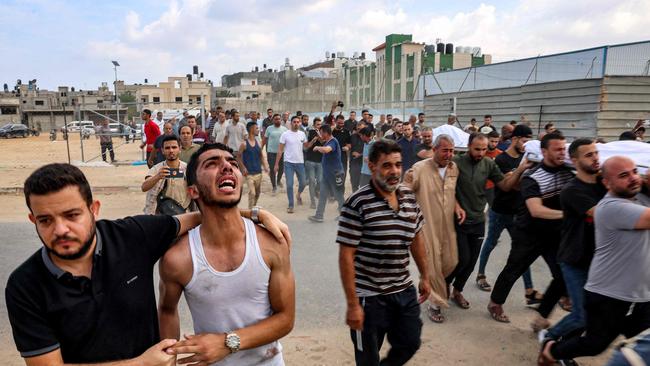
With Israel’s military having ordered a total siege on Gaza, supplies of food, fuel and water are no longer reaching the enclave, leaving Gazans in the dark with thinning supplies as explosions rock their buildings at night. Gaza’s only power plant ran out of fuel on Tuesday, Gaza’s energy authority said.
Of the more than 260,000 people who have fled their homes, more than half are sheltering in schools run by a United Nations agency that serves Palestinian refugees, the U.N. said early Wednesday. Others are seeking shelter in hotels.
With military operations under way, Israeli Prime Minister Benjamin Netanyahu and opposition leader Benny Gantz, a former chief of staff of the Israeli military and defense minister, said they had formed a unity government to manage the country’s war with Palestinian militants.
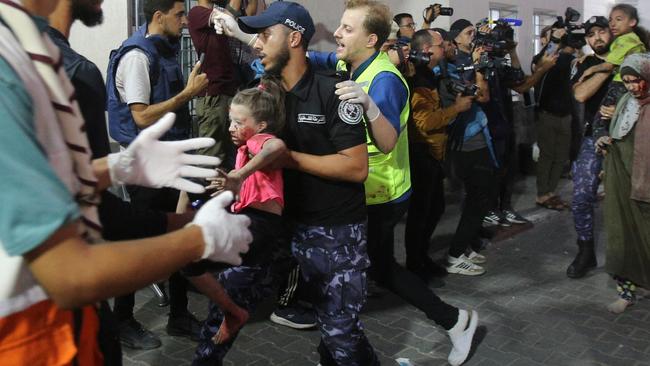
Netanyahu and Gantz would join a small “war management cabinet” also including Defense Minister Yoav Gallant, according to a joint statement issued Wednesday.
Netanyahu has come under domestic political pressure over the Hamas attacks, which caught the government, the military and intelligence services by surprise.
The Israeli military on Tuesday urged Palestinians in Gaza to leave via a border crossing with Egypt, but Palestinians can’t cross the border without a special permit. Israeli forces have bombed the crossing three times in recent days, leading to long disruptions at the border for those who have permission, according to local authorities, Egyptian officials and the U.N.
The mass displacement in Gaza is piling pressure on Egypt to open its border with the strip to allow refugees to flee, illustrating how the situation in Gaza and Israel threatens to spill over into a broader regional crisis. The White House said the U.S. is discussing with Israel and Egypt options for granting safe passage to Egypt for civilians living in Gaza.
“Civilians are not to blame for what Hamas has done,” National Security Council spokesman John Kirby said Wednesday. “They didn’t do anything wrong.”
Egypt’s military-backed government has tightened its restrictions on both Gaza and the neighboring North Sinai region in recent years, and has shown no indication that it will accept a tide of refugees.
In Gaza City’s al-Karama neighborhood, Ahmad Hassouna, a 42-year-old man wearing an orange T-shirt, a pair of glasses tucked into his collar, paused to catch his breath as he stepped over rubble in the street.
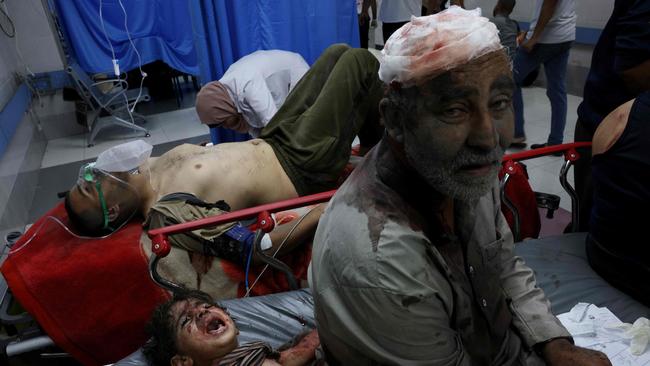
“We all came out, my sister, my brother, my mother and me. We were all here on the ground and we were all injured. We called for an ambulance and when it came, they struck the ambulance,” he said, describing how his family fled an airstrike the night before.
“Forget human rights, we don’t even have animal rights,” he said.
The Palestinian Red Crescent aid organization said later on Wednesday that Israeli forces had struck an ambulance in the northern Gaza Strip, killing three medics. The World Health Organization said it has documented 37 attacks on health facilities and ambulances which had killed six medics before Wednesday.
Nine employees of the U.N. Relief and Works Agency for Palestine Refugees have been killed since the offensive began over the weekend, the agency said on Wednesday.
Israeli forces exchanged fire with Lebanon’s Hezbollah for a fourth consecutive day on Wednesday, dialing up fears that a second front could open up in the war if the Shiite Hezbollah movement chooses to enter the fray.
The Israeli military said an antitank missile from Lebanon was launched toward a military post near the village of Arab Al-Aramshe along the Lebanese border on Wednesday morning. Israel said it struck in Lebanese territory in response.
Hezbollah said it fired a missile at an Israeli military vehicle in retaliation for an Israeli attack that killed three members of the group on Monday. An Israeli military officer was also killed in the clashes.
The clashes with Hezbollah and with Palestinian armed groups in Lebanon have so far been limited in scope and within the broad rules of engagement understood by both sides, military analysts say.
If Hezbollah were to fully join the war, it could spell catastrophe for both Israel and Lebanon. The Iranian-backed group has a powerful militia of fighters who are battle-tested from the war in neighboring Syria and an arsenal of missiles capable of striking deep inside Israel.
Israeli officials have said that the offensive in Gaza would be larger and more severe than any in recent memory.
The Israeli Air Force said Wednesday that it launched more than 80 airstrikes that it said hit weapons stockpiles, bank branches used to fund Hamas and underground tunnels used by militants. The air force also said it struck high-rise buildings in Gaza.
Palestinian residents, medics and the U.N. said the strikes killed and injured civilians.
Dr. Ghassan Abu-Sittah, a British-Palestinian surgeon stationed at Gaza City’s largest hospital, said an increasing number of children are among the wounded flooding into a hospital already full of injured people.
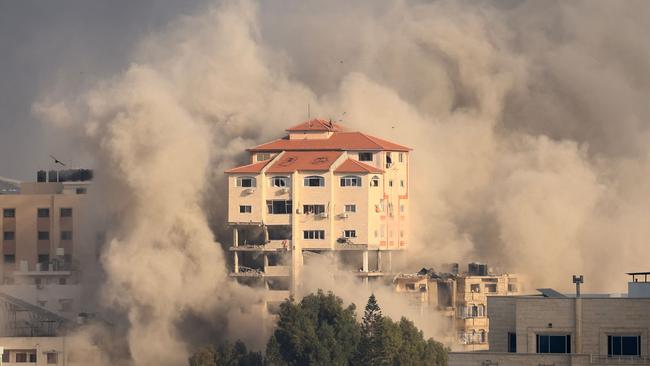
“This morning, we had a child, a beautiful young girl with really indescribable facial injuries, whose mother was a doctor at Shifa and who was killed when their home was targeted. Last night, a 10-year-old boy with devastating facial injuries, who was taken out of the rubble of his home,” he said.
“The situation continues to deteriorate,” he said.
“Several residential buildings in heavily populated areas were also targeted, resulting in casualties, including among the elderly, women, and children,” said the U.N.’s Office for the Coordination of Humanitarian Affairs.
The Israeli military has said that it has a reduced capacity for precision strikes because its forces are stretched thin.
An Egyptian official said the government is expecting a large number of Palestinians to attempt to cross the border soon, whether or not the Rafah crossing point is reopened. Egypt’s President Abdel Fattah Al Sisi could face public pressure to open the border if that happens.
“Sisi is stuck here. Allow them in and avoid a public uproar or let them die to protect Sinai,” the official said.
The military offensive and siege are cutting back on Gaza’s already limited basic services, limiting supplies of running water and reducing supplies of electricity to three or four hours a day, according to the U.N.
The strikes also destroyed two of Gaza’s three main lines for telecommunications, leaving Gazans with little to no internet or mobile service.
Israel imposed a strict closure on Gaza in 2007 after Hamas seized control of the strip in a military takeover that followed their victory in a Palestinian parliamentary election a year earlier. The restrictions ended decades in which many Gazans worked in Israel and moved freely throughout the country following Israel’s 1967 occupation of the territory.
The enclave has been in a long-running humanitarian crisis ever since, as the closure devastated Gaza’s economy, which had once been integrated into Israel’s. A series of wars between Israel and Hamas has further devastated Gaza’s infrastructure.
The worsening situation in Gaza poses a challenge for the Israeli government. Netanyahu has promised a response to the Hamas attacks that he said would be remembered by Israel’s enemies for decades to come.
But any attempt to dislodge Hamas, with its thousands of fighters and network of underground tunnels, could result in a long and costly war of attrition. Even if Israel were to reoccupy Gaza, it isn’t clear who would take charge of the enclave in the aftermath.
“He’s got to do something that allows him to say that he’s made good on that. A huge number of Palestinians casualties may go some way to meeting that bar, but may somehow feel insufficient,” said Daniel Levy, president of the U.S./Middle East Project, a policy institute, and a onetime adviser to former Israeli Prime Minister Ehud Barak.
The Israeli military said it is mobilizing more than 300,000 reservists ahead of an expected ground invasion of Gaza.
Vivian Salama in Washington and Summer Said contributed to this article
The Wall Street Journal

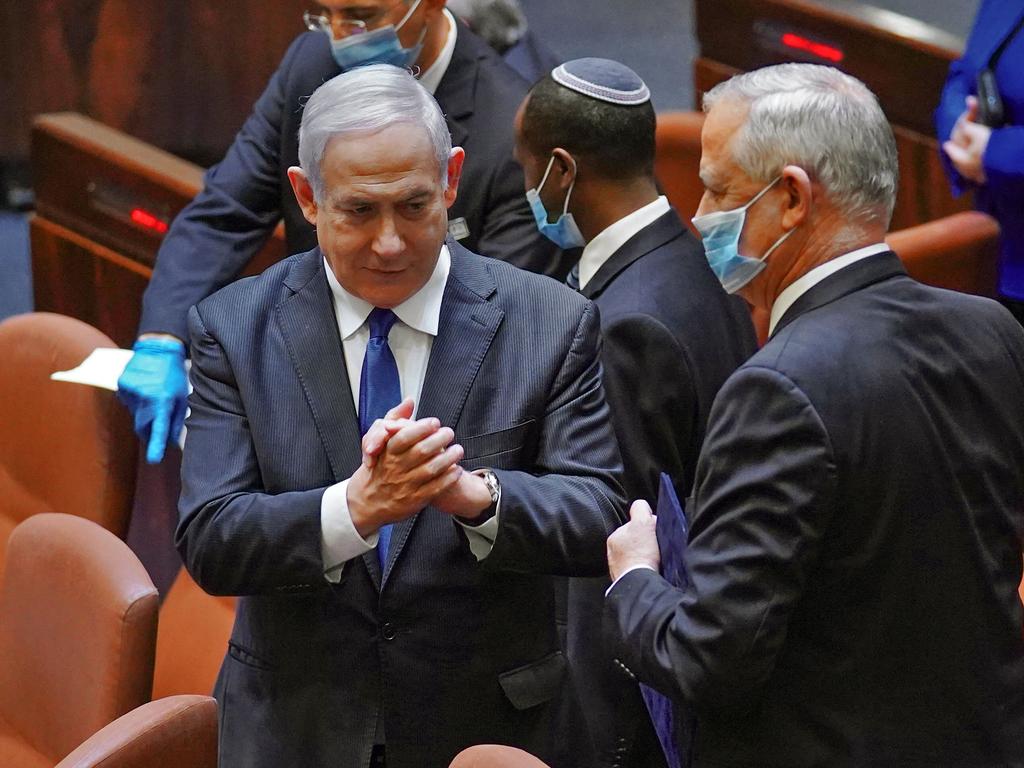


To join the conversation, please log in. Don't have an account? Register
Join the conversation, you are commenting as Logout